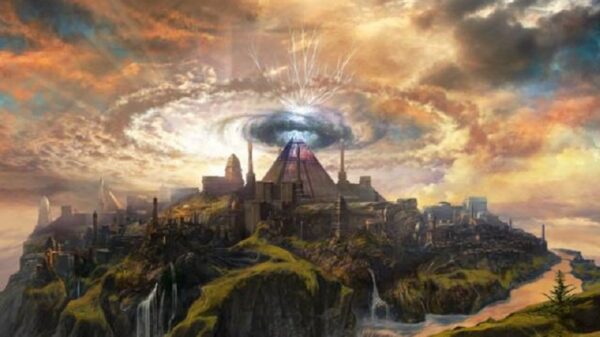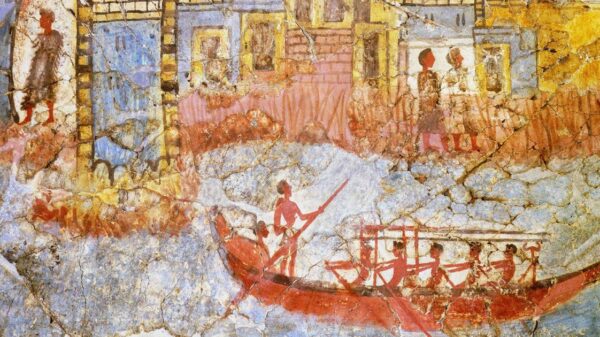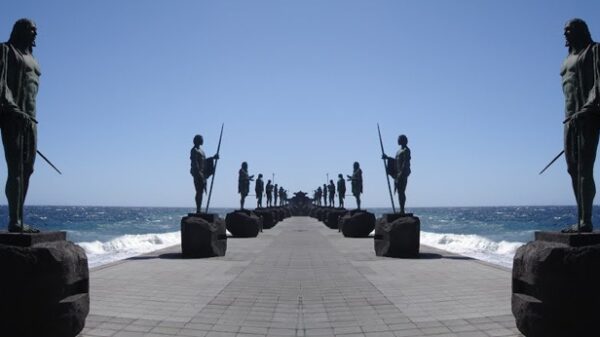Researchers have purportedly found the lost city of Atlantis off the coast of Lanzarote, Spain. Should this be confirmed, it could be considered the most significant discovery ever, with the potential to alter our understanding of history.
The lost continent is often hailed as the greatest myth ever recounted, assuming the proportions of an actual historical event. For many, it is regarded as a historical truth awaiting confirmation. The lost city of Atlantis is among the most ancient of such myths.
The tale began with the ancient Greek philosopher Plato (427 – 348 BC), who postulated the existence of an advanced civilization that thrived approximately 9,000 years before his era.
He asserted that this civilization possessed technology far beyond its time and was characterized by extraordinary architecture. According to him, they inhabited a vast island situated beyond the “Pillars of Hercules,” now identified with Gibraltar.
Plato alleged that a catastrophe befell Atlantis, causing the entire island to submerge into the sea within a day. It was commonly held that the island’s descent into the ocean was a consequence of its inhabitants’ immorality.
The lost continent is the greatest myth ever told and has taken on the dimensions of a historical event.
Although no concrete evidence of Atlantis has been discovered, numerous indications of its presence are found not only in Plato’s narratives but also in the myths of cultures spanning both east and west of the Atlantic Ocean. These accounts include references to not just European peoples but also to the Mayans and Aztecs of what is now Latin America.
Plato wasn’t the sole ancient writer to reference island nations in the Atlantic Ocean. The historian Theopompus, from the 4th century BC, described a vast continent populated by giants. The geographer Marcellus referred to 10 divine islands. In the 17th century, German scholar Athanasius Kircher produced a geographical map of Atlantis, marking the start of the quest for the fabled land of the Atlanteans.
Enthusiasts search for traces of Atlantis not only in the Atlantic but also in the Arctic, near the northwestern shores of Europe and Africa, within the Bermuda Triangle, and near Cuba, the Bahamas, the Azores, and the Canary Islands, as well as close to Sicily, Malta, Cyprus, and Crete. Many researchers believe that the Atlantean kingdom was not a single landmass but rather a vast archipelago.
Myths and legends from nearly all civilizations across both hemispheres of the Earth mention founders of their cultures who emerged from the ocean’s depths or lands far beyond the horizon. These legends often speak of a homeland of these pioneers that was destroyed by a catastrophic event.
Thus, it’s conceivable that there were multiple Atlantises throughout human history.
Researchers participating in the IGME-CSIC Atlantis project in Spain are convinced they have uncovered the myth. Utilizing an underwater robotic submarine, they found a chain of submerged islands off Lanzarote’s east coast.
Descending to a depth of 2,500 meters, the submarine retrieved samples from the seabed of an island believed to have sunk millions of years ago.
They have since christened this land “Los Atlantes,” in homage to the ancient legend. Marine geologist Luis Somoza, from Spain’s Geological Service, shared insights with Live Science:
“This could be the origin of the legend of Atlantis. We have identified beaches, cliffs and sand dunes on the flat top of the underwater mountain.”
Somoza added:
“They were islands in the past and they have sunk, they are still sinking, as the legend of Atlantis says.”
Research indicates that the Los Atlantes archipelago existed during the Eocene epoch, from 56 to 34 million years ago. Scientists have discovered that these submerged islands still retain features such as beaches, cliffs, and sand dunes. Some are situated a mere 60 meters below the water’s surface. It is possible that during the last Ice Age, with significantly lower sea levels, these lands could have supported wildlife.
The geologist stated that the cessation of volcanic eruptions led to the increased solidification of lava, contributing to the sinking of the islands into the ocean.
Moreover, Plato, along with his contemporaries, held a more solemn perspective compared to today’s populace. They believed their writings to be the unequivocal truth.


















